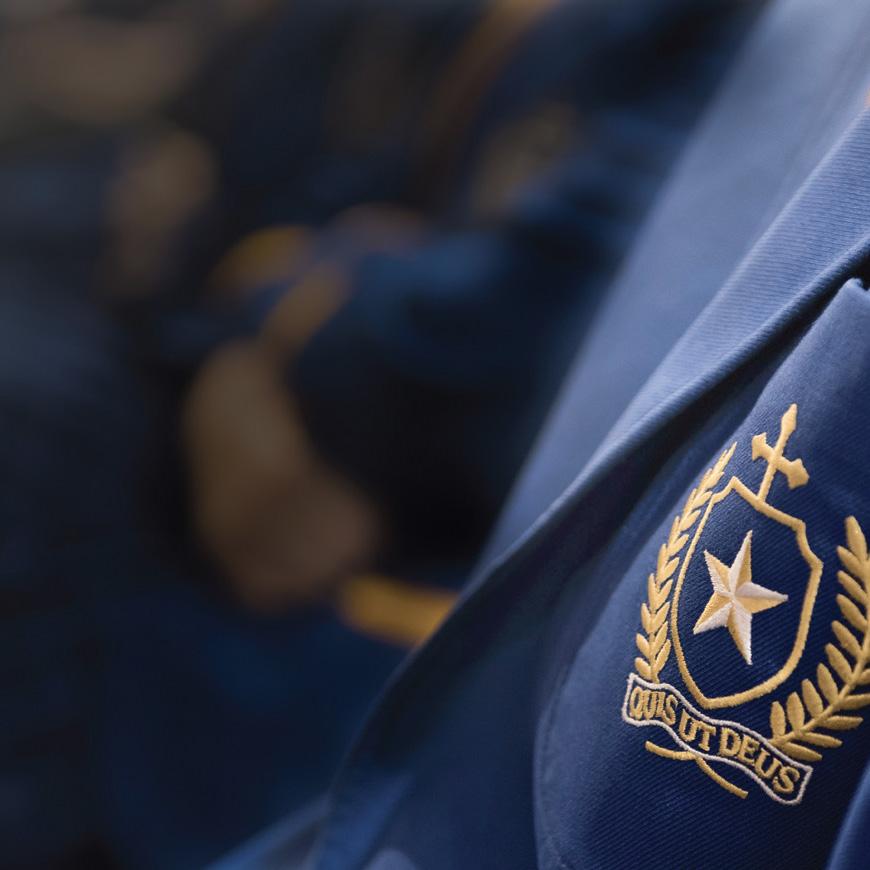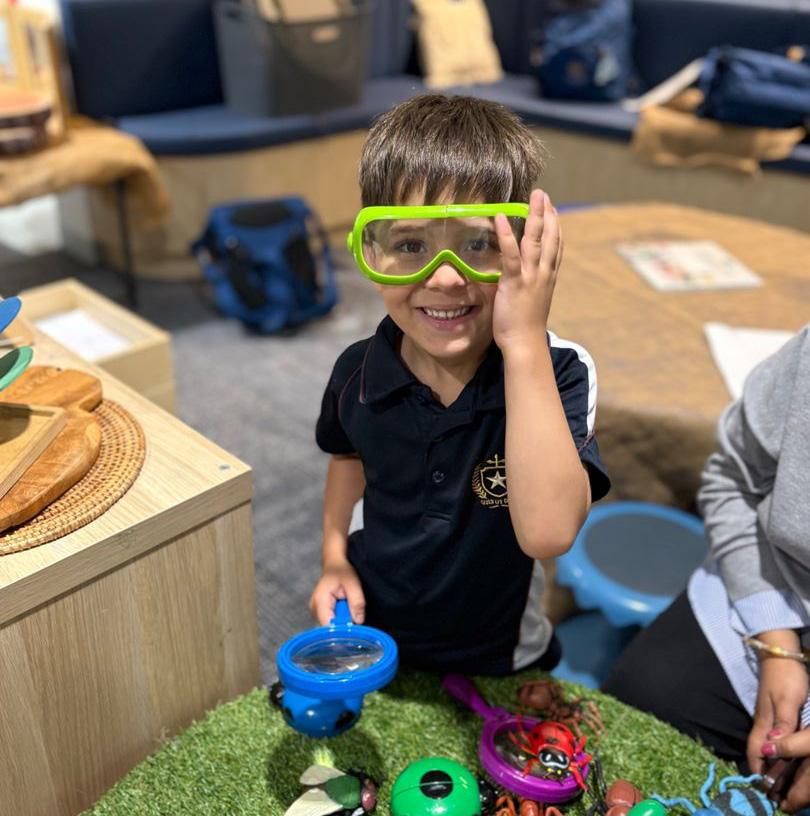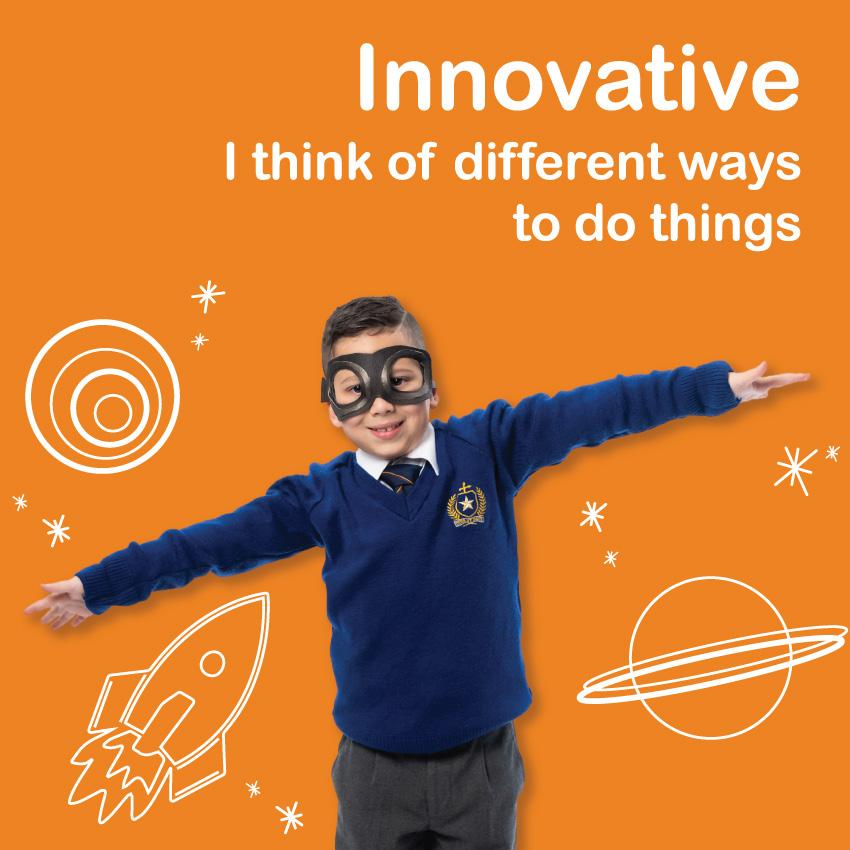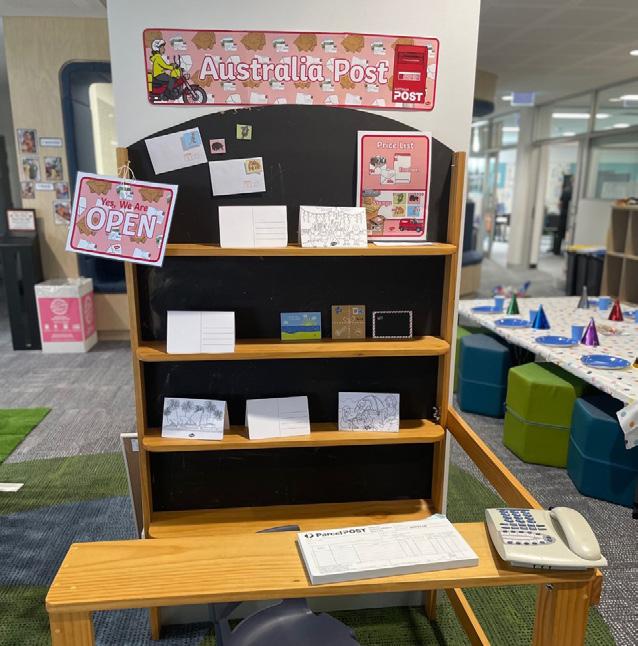

MISSION AND VISION STATEMENT WHO WE ARE
Mission and Vision
St Michael’s College is a Catholic school in the Lasallian tradition which is committed to the human and Christian education of the young, especially the poor*, through Community, Challenge, Choice.
Community
We are an inclusive and respectful community where each individual is known, valued and cared for, enabling them to feel confident to explore their curiosities, flourish and fully realise their potential.
Challenge
Individual growth is achieved through engagement, opportunity and recognition, underpinned by a positive learning culture that is authentic, challenging and supportive.
Choice
Through a quality Lasallian education, inspired by the Gospel and a concern for social justice, students are empowered to better choose who they become as people, learners and leaders in the world.
* The Lasallian school calls its members to an awareness of the poor and victims of injustice, and responds to their needs through programs of community service, advocacy and justice education.
Our Purpose
St Michael’s College is dedicated to a whole of College approach to facilitate our Catholic and Lasallian educational experience. Our strong heritage is based on the principles of 300 years of Lasallian Education, guided by the De La Salle Brothers and our Founder’s teachings.
A member of the global Lasallian family, St Michael’s College is committed to create a welcoming, inclusive Lasallian community, aligned with strategic commitment to optimise student experiences and outcomes.
Our commitment is to provide opportunities that will prepare students to be compassionate and enthusiastic participants in society who prioritise service to others, especially the marginalised and those in need. Guided by Lasallian teachings, enriched by contemporary educational theory and practices, students, staff and families are empowered to flourish and find success.



“We
CONTEXT
Playful Inquiry refers to a pedagogical approach in the Early Years of St Michael’s College. It seeks to harness the power of children’s natural ways of learning to explore and develop:
• College Primary Values
• Conceptual Understandings
• Learning Dispositions
• Social and Emotional Learning
• Critical and Creative Thinking
• Oral language
We believe that deep learning happens when children:
• are actively engaged with materials and each other
• are part of the process, involved in decision making
• involves and integrates whole child – physical, intellectual, emotional, spiritual, social
• feel safe, secure, and confident within their environment
• relationships of trust and support are established
• tap into children’s natural sense of curiosity and wonder
• are seen as strong, competent learners, filled with potential.
• their ideas and theories are listened to and valued.
Play is children’s natural way of learning and provides the context for:
• Revisiting, practicing, and consolidating understandings
• Following individual learning pathways
• Building of relationships, social and emotional learning, and wellbeing
• Creative and critical thinking - testing ideas, challenging each other’s thinking, and building new understandings
• Literacy and numeracy concepts to be consolidated and skills practised
• College Primary Values can be lived and developed
Our pedagogy:
• Recognises and expands upon children’s strengths
• Allows for individual learning paths and progressions
• Provides uninterrupted time for exploration and play
• Encourages children’s agency in their learning, providing access to materials so children can be self-directed and self-manage their learning
• Includes opportunities for child-led, child-initiated and teacher-guided learning experiences
• Integrates the content from the Australian Curriculum as children demonstrate the ability to access it
• Listens to and honours children’s cultural contexts, ideas and theories, using these to launch and delve into learning
• Is concerned with exploring concepts that are interdisciplinary and transferrable across time and contexts.



PRIMARY VALUES
Playful Inquiry provides a context for the Primary Values to be developed. Educators intentionally consider the Primary Values when planning and assessing.










ROLE OF THE EDUCATOR IN PLAYFUL INQUIRY
• Intentionally plan – for play contexts (see below). Use collaborative planning process (see below) of documenting, reflecting, interpreting and relaunching.
• Create playful learning contexts that connect to learning goals for children.
• Listen, observe and document in order to make learning visible and inform the planning process.
• Participate in play, sharing in the joy of playing with children, building relationships and understandings of the children.
• Participate in play with the intention of extending and enhancing play scripts, oral language and participation.
• Guide and question to extend thinking and understandings, being mindful to honour children’s agency in their play.
• Make the learning in playful inquiry visible to communicate to families, children and colleagues.
• Plan for frequent and regular playful inquiry sessions.
• Ensure variety of playful learning contexts. eg small groups, larger groups, whole class and cross class interactions.

LEARNING ENVIRONMENT
The learning environment for playful inquiry include classrooms, the college grounds, and other shared spaces. Educators intentionally create contexts for play, connecting to the term’s inquiry projects, literacy, numeracy and developmental goals.
The educators collaborate to plan for, organise, source and create the learning environment, with a particular emphasis on contexts for play and exploration. The contexts are created with an eye to aesthetics, so that children can see the potential in the materials and play spaces. Educators and children share the responsibility of maintaining the physical learning environments, resetting them after play and ensuring materials and play props are in good condition.
Contexts include opportunities for large and small play, cooperative, parallel and quiet independent play.
Contexts include:
• Dramatic Play -eg: campsite, home/kitchen, café/ restaurant, post office, airport
• Construction eg: Lego, blocks, mobile, boxes
• Small world play eg: dinosaur world, fairy garden
• Story tables eg: The Very Cranky Bear
• Sensory play – eg: sand, water, coloured rice, potion making, playdough
• Visual Arts – eg: painting, observational drawing, mark-making
• Bookmaking
• Fine Motor – eg: peg boards, woodwork
• Loose Parts play (large and small) eg: cubby building



PLANNING, ASSESSING AND DOCUMENTING PROCESS
Educators collaborate to plan for Playful Inquiry. This includes setting up for Playful Inquiry contexts, reflecting on documentation and observations, connecting to learning and developmental goals for children and maintaining the learning environments ready for children’s play.
Our Intentions
Identify individual and group strengths, interests, and goals. What are our hopes for children?
Reflective Planning Cycle
Collaborative Planning & Preparation
Clarify specific intentions, learning environment, role of educators, focus for documentation
“Childhood is a time to be, to see, and to make meaning of the world”.
- Early Years Framework 2009
LANGUAGE WE USE
Theories
An interpretation of an idea or a response to a question. Theories are ‘working theories’ in that they are temporary and subject to change. Our play, exploration and interactions inform our personal theories. Theories are formed by children and adults. Children express their theories in a variety of ways, such as drawing, mark-making, oral language, pretend play, construction and movement. Listening to others’ theories can provoke further thinking and investigation.
Provocations
Are offered to children with the intention of igniting engagement, connection and curiosity. They seek to nudge thinking, to listen to different perspectives or create new wonderings. Provocations can be offered by children and adults. They can be a physical artefact, a learning experience, a picture book or visual text, a question, or a different opinion.
Invitations
Are offered to children with the intention of enhancing their participation in play. Invitations are thoughtfully created so that children can see the possibilities and potential for their play and exploration. They can be set up (and added to) by children and adults and are often physical spaces but can be experiences.
Inquiry
An approach to learning and teaching that sees children as active participants in their learning. It seeks to ignite curiosity in the world, harnessing children’s wonderings and questions to drive learning. It describes the way children learn and is also a mindset of the educator. Educators use their knowledge of the curriculum, their children and learning theory to create conditions that enable children to lead their learning. The educator guides and provokes children into deeper thinking about concepts.
Play
Play is children’s natural way of learning about the world, themselves and others. Children at St Michael’s have the right to choose their play experiences. Play can be cooperative, parallel and solitary. Characteristics of play include open-endedness, child-led, uninterrupted time and intrinsic motivation.
Pedagogical Documentation/ Documentation Process
A process used by educators to gather memories and evidence of learning that unfolds during Playful Inquiry. These can be artefacts, photographs, videos, anecdotal notes and sketches. Documentation seeks to make the learning visible to families and children. It can be used with children to relaunch a line of inquiry. It is also used in reflective planning in teams (see Planning Cycle).
Playful Learning Contexts
Contexts are the places where learning happens. They can be created as invitations or provocations. The context is a place where children are secure to participate and share their theories through their play.
Concepts
The big picture or over-arching idea. They are ideas that can be thought about across different subject areas and topics. They are abstract and open, nudging children to think beyond facts. For example, a topic would be “The First Fleet”. Possible concepts would be ‘change’ or ‘migration’.
WHAT DOES PLAYFUL INQUIRY LOOK LIKE AT ST MICHAEL’S COLLEGE
Reception Example (Term 3)
Inquiry Topic and Learning Areas:
• My Story, Your Story, Our Story (Inquiry - HASS),
• Celebrations (Religion - links to HASS topic),
• Fairy Tales (Spotlight - Book Making),
• Weather (Inquiry - Science).
Concepts:
Change over time
• ACARA HASS Achievement Standard: They identify how they; their families and friends know about their past and commemorate events that are important to them.
Culture
• ACARA HASS Achievement Standard: Students relate stories about their past and share and compare observations about familiar places.
Tradition
• Crossways - Church for the World: Celebrations are important part of all religions and families.
Playful Learning Contexts:
Campsite
• A place where stories have been made and are shared.
Post Office
• Stories can be shared through writing postcards. Celebrations are acknowledged through buying and writing cards, sending invitations.
Party/Celebration Table
• A space for a celebration to be created. Open for students to develop their own ideas in what their celebration needs. This included students creating paper chain streamers, making presents from box making, birthday cakes out of playdough etc
Blocks – Construction
• Included visuals to promote new ideas. What place have you been to?
Fairy Garden
• Small quiet play area – developing students social and emotional needs.
Creative Zone
• Fine motor skills – beading
Weather Drawing
• Observations of weather, what do you notice. Quiet area for students who enjoy the calm space.
Sensory Tray
• Indigenous symbols and art works in sand. An opportunity to share stories and create stories using different forms.
Lego Table
• Fine motor skills and collaboration



Lasallian STARS Example (Term 3)
Inquiry Topic and Learning Areas:
• Watch me grow!
• HASS
• Science (Growing Well)
- How does a flower grow...
- Flowers in our world.....
• English
• Health
- we are all created unique
- our families and background impact who we are
- our bodies work in amazing ways
- parts of our body
Concepts:
• Identity
• Diversity
• Growth
• Life and living
Early Years Framework:
Outcome 1 Children have a strong sense of identity
Outcome 2 Children are connected with and contribute to their world
Outcome 3 Children have a strong sense of well being
Outcome 4 Children are confident and involved learners
Outcome 5 Children are effective communicators
Playful Learning Contexts:
Home corner
Dramatic play area where children can play ‘families’. Children can take on the roles of various family members and
Doll house
• Small world play Doctors
• Take on roles of health care professionals, take x-rays, fill in patient forms
Flower shop
• Role play shop staff, gardeners, delivery people, sell seeds and plants
School garden
• Plant seeds, tend to flowers
Loose Parts Play
• Creating flowers and gardens, creating self portraits, using loose parts to create body parts (eyes/skeletons)
Visual arts
• Observational drawing -flower still life, self portraits,
Story tables
